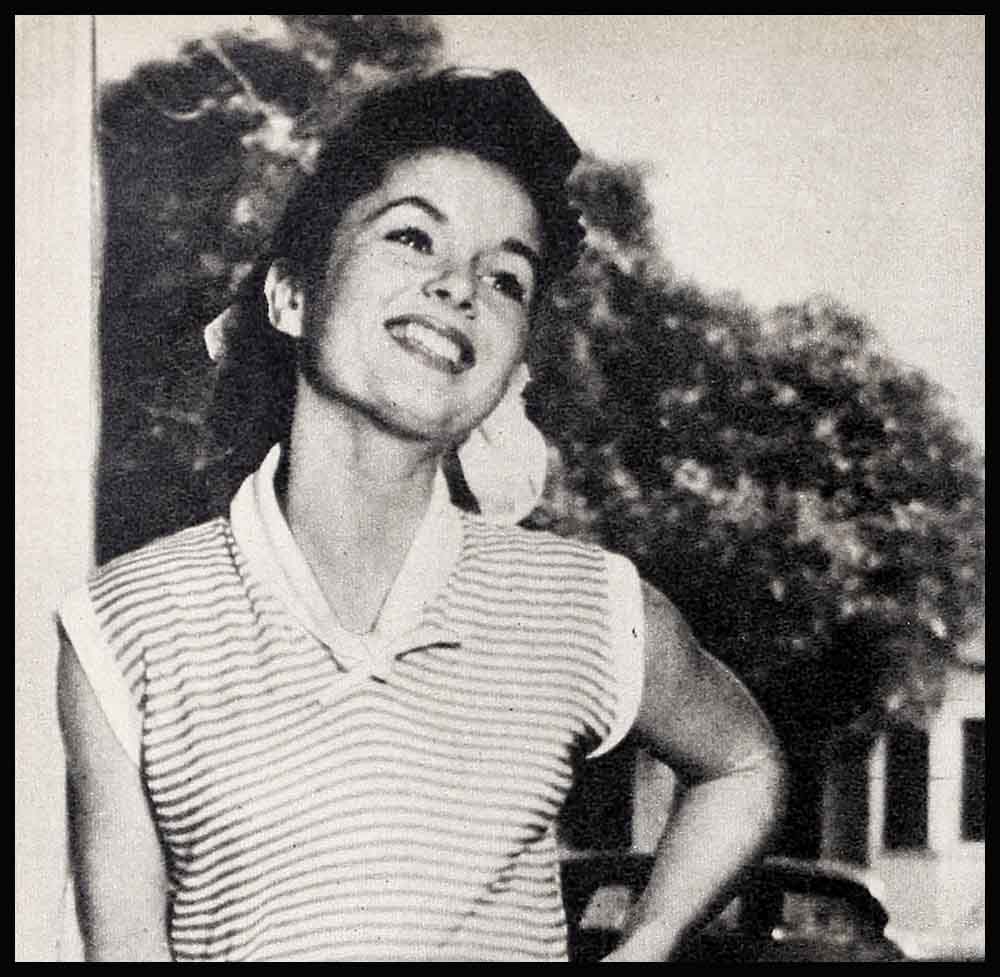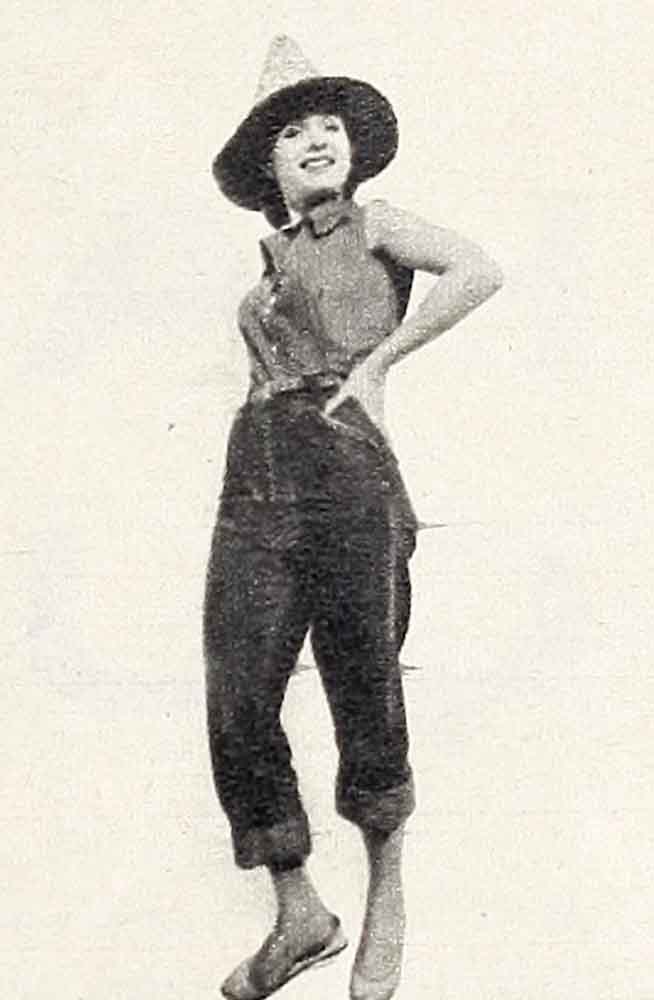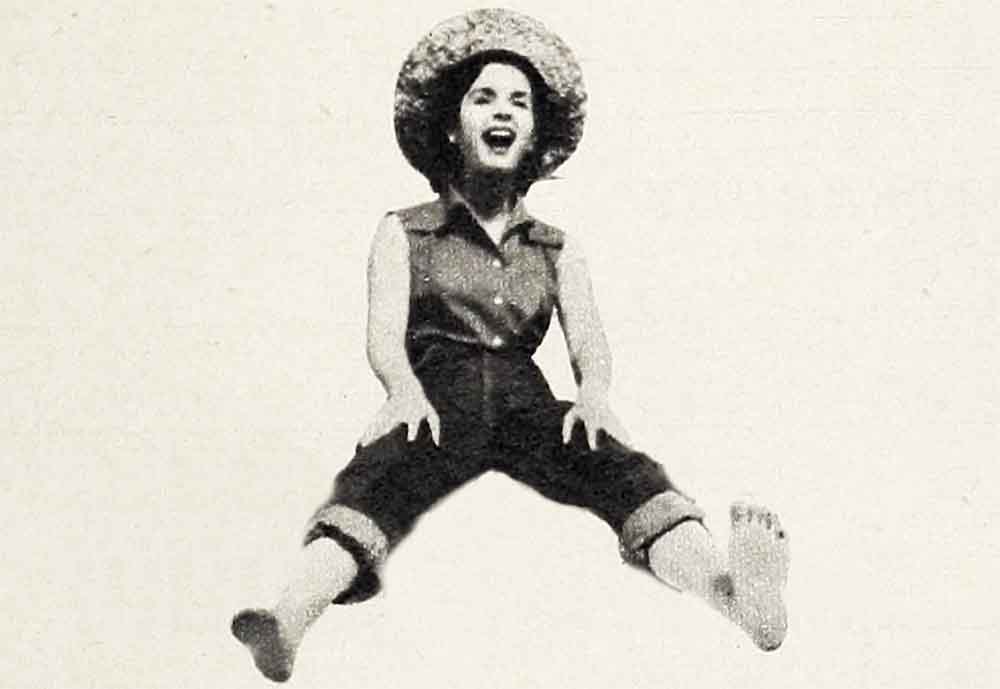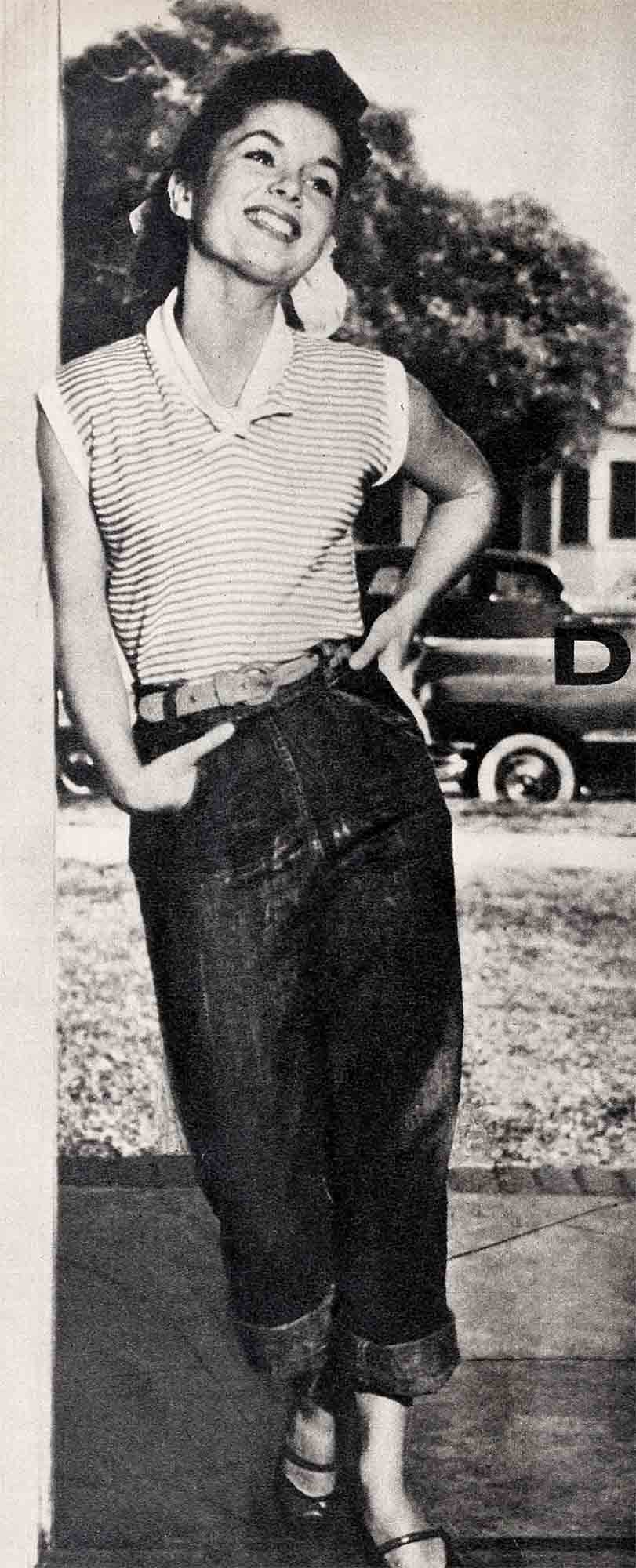
Debbie Comes Of Age
Debbie Reynolds has come of age. On April first she rounded that wonderful comer called “Twenty-one”—the big day in everybody’s life. But does that mean that she is going to change her ways of living? Debbie doesn’t think so.
“So I’m twenty-one,” she says, “so what? Am I supposed to kick over the traces and ran wild? That’s crazy. Besides, what’s so magic about the number twenty-one?”
That’s a good question. A better one was the one the bank asked. They called to find out what she wanted done with the money (earned in pictures before she came of age) that would be transferred to her account on her twenty-first birthday.
“Hang on to that dough,” said Deb, “put a guard around it. Even if it isn’t the Rockefeller Foundation, there’s a very special project I want it to go into.”
Project it is! Debbie’s decided to build (perhaps buy) an apartment house, with the money. No April Fool is Deb.
“An apartment house is right,” says Debbie, “and with plenty of closets, but plenty! Probably want to call it ‘Closet Inn.’ In fact, I’m going to ask the architect to design the closets first, acres of ’em, and then hang the apartments around them.”
AUDIO BOOK
Debbie wants the apartment house to be a gift to her parents. Her dad, she says, will have a ball taking care of it. Debbie remembers the idea first came to her when she was winging her way homeward from entertaining the troops in Korea this past January.
“There I was in that Army plane,” Debbie says, “surrounded by all the gifts I’d bought in Japan. My pockets were stuffed full of silk things, and I held my most precious buy, a hundred-year-old cuckoo clock for my mom, in my lap. There were three sets of china that I had, too, but there was no room around me, so the pilots were kind enough to store them with their gear.
“They knew their business, but you can’t see air pockets and they seemed to run into all of ’em. Every-time we’d hit one, the plane would drop like an anchor. My poor little cuckoo couldn’t take it. His mainspring must have been sprung or something. Each time we hit an air pocket he’d pop out, ‘cuckoo,’ stick out his tongue at me, and then scurry back inside the clock.”
According to Debbie there was hardly enough room for the people in that plane. Because she was surrounded by all her purchases, she couldn’t help thinking of some of the other things she’d wanted when she first started out in pictures.
“I’d always dreamt of three things,” Debbie admits. “A swimming pool, a pearl watch, and a trip to Paris. I saved the trip to Paris for the last. I promised it to myself on my twenty-first birthday.”
Debbie has the swimming pool and she has the watch. She calls the pool her “Abadaba” pool because she earned it from the royalties on her recording of “Abadaba Honeymoon.” The pearl watch her parents gave her, much to her delight and surprise.
As for the Paris trip, Debbie had planned it to be the maddest ever! A trip to end all trips. First class, real gone and with breakfast in bed!
“But it was in that plane that the idea for the apartment house hit me,” explains Debbie. “Seriously, we’re all looking for happiness, and I remember thinking on that plane, ‘There was a time when I thought happiness could be found in things, like the pearl watch and the swimming pool.’ Then I wasn’t so sure. . . .”
Debbie remembered the happiness that her parents enjoyed in giving the watch. She also thought about the fun she got from watching the gang on the block swimming in her new pool.
“I remembered thinking on the plane,” she says, “that the happiness I’d so far experienced was in people and not in things.”
Besides, the seriousness of the Korean situation weighed heavily upon Debbie. She had been touched by what she had seen, yet she determined not to discuss it in print for fear the boys would think she was capitalizing on her visit. Debbie’s young heart was full of the love of giving, and she intended to put it into practice when and where she could.
It was this inspiration that made Debbie decide to give the apartment house to her parents after her twenty-first birthday instead of taking the mad Paris trip.
“I can always go to Paris,” laughs Debbie. “Maybe in a year or two. I do believe that Paris will be there for a looooong time to come!”


Just now Debbie is interested in planning the apartment house. She says she’ll surely have one of the singles for her very own!
“I hate to be alone, but I need some place to keep my clothes and to spread out. However, since my parents will live in another apartment, I’ll still be close to home, and it won’t be living alone at all. I love my parents and just because I’m twenty-one doesn’t seem to be reason enough to fly off somewhere else.”
Some people feel, though, that there’s an age when every young boy or girl should break away from home in order to develop independence. Debbie agrees.
“But,” says Deb, “it’s an individual problem. Some leave earlier than others. Look at me for example. I’ve been on my own since I was sixteen, so I’ve been away from home many times and then back again. I think my case is different since most kids don’t travel as much as I do.”
If you’re married, however, Debbie thinks living away from your family is best. But again, it’s an individual problem.
“Course, I’m not married,” says Debbie, “but . . .”
“Married” being the magic word it is, Debbie’s pretty blue eyes sparkle and light up like New Year’s Eve.
“But—that doesn’t mean I don’t have a man in mind. A sort of ideal man, that is. He’s got, but got to have a sense of humor for sure. For his own protection, ’cause I’ll probably be teasing him ’round the clock. Then he should like sports, because I like sports. And I feel that the more things we have in common the better. As for his job, I don’t care if he’s in the picture industry or not. Just doesn’t make any dif. He could sell doughnuts as far as that goes. Lastly, he’s got to love children, and I do mean love; because I want four!”
There was a time in Debbie’s life when romance added up to one R. J. Wagner. According to Debbie this is no longer so.
“Well, I guess you can say we still see each other, but we don’t date any more. However, I think R.J.’s a terrific guy. He has a new apartment in the same building with Dan Dailey that he decorated all by himself. I understand it looks fine, too. I think it’s great that he can manage so well. Lots of the younger kids have trouble handling their finances, and when they get off by themselves too much is expected of them. They go overboard financially.
“Not R.J. He’s got a good head on his shoulders. I think he got it from his dad. I know that if there is any of the bank’s loot left after we build the apartment house, I’m going to ask Mr. Wagner to help me invest it in some good old-fashioned solid-jackson stocks!”
Besides the financial advantage of sharing the new apartment house with her parents, Debbie feels that her family is good for her. They help keep her feet on the ground.
“In fact, they’re always on my back,” is Debbie’s lament. “Recently I had a still picture of me that I thought was terrific. It was one of the first stills that I’ve really liked. It actually made me look beautiful, all eyes and everything. So I took it home on my birthday and showed it to everyone there. And what do you think? ‘Nice picture, huh?’ I said.”

“ ‘Well, yes, it’s nice, very pretty, but it doesn’t look like you,’ they say.
“ ‘Oh, no?’ says I. ‘Well, who, just exactly who, does it look like? İt looks more like me than like anybody else I can think of.’
“ ‘Oh, sure, sure,’ they say, and then comes the punch line, ‘but it’s just too pretty, Debbie, to be you. It just must be somebody else!’
“So you see they keep me steady on my feet all right. I’ll probably have to be a hundred years old before they’ll say anything flattering. Even being twenty-one doesn’t make any difference. At least not around our house!”
There’s more than just a steadying influence in Debbie’s relations with her parents. The emotional bonds that tie Debbie to her family are strong.
Christmas and New Year’s, for example, have always been two of the nicest days in the year to Deb. But when she made the Korean trip she had to give up this festive holiday time at home.
Debbie remembers when she returned with her four boxes full of presents that she was surprised to find the Christmas tree still standing, lights burning like fireflies, and her presents from her family and friends still unwrapped and waiting patiently for her under the tree. It’s lucky the tinsel glistened the way it did because it kept the tearful gleam of happiness on Debbie’s eyes and cheeks from being quite so obvious. No, Debbie’s found, you don’t have to be twenty-one to be sentimental. Twenty-one or ninety-one she hopes it never changes.
But it’s known that Debbie and laughter walk hand in hand. She can’t stand being damp-eyed for long, so she broke open her four “trunks from Cathay” and began handing out the gifts. Ivory and cameo for Mother; beaded purse for sister-in-law, Joyce; baby niece, Gail, got a fur-lined vest but decided not to wear it!
“For no good reason at all,” says Debbie. “Imagine, a perfectly good fur-lined, fur-lined, mind you, vest! But she turned up her cute ’lil nose at it.” Debbie shrugs.
Then it was Debbie’s turn to open gifts. First, the present from her agents, a pair of pearl bracelets that joined to make a charming choker.
“It’s real elegant,” boasts Deb. “I think pearls are in such good taste, because they’re dressy without being loud or obvious. Not that I’d throw away diamonds. I mean, not completely . . .”
In addition, one of Debbie’s neighbors made her a pair of lounging pajamas and her parents, after much hinting, gave her a bowling ball with a plaid carrying bag.
“Mad, absolutely mad,” says Deb. “Those p-jays are simply crazy. And the plaid bag, well, really, it’s just the last word. I go onto the lanes, and you’d think I was driving a solid gold Cadillac! Let me tell you we had a ball. Our own special December 25th smack in the middle of January.”

The warm secure feeling that Debbie gets from this wonderful family of hers that is always giving is the thing she never wants to change. She will never let her being twenty-one pull her away from it.
“In fact,” she says, I couldn’t think of celebrating my twenty-first birthday without the family. We had our own special party again. A lot of laughs, the wonderful enchilladas Mom makes, and gag gifts.
“The thrill was the family’s serious gift, a lovely pearl ring. Just what I really wanted! It was the nicest birthday I’ve ever had, not because I was twenty-one but because we were all together again!”
Debbie said her mother was the only one who gave them any trouble. Though her brother Bill came all the way from Korea, and Dad stayed home from work, mother had to push to find time in her busy schedule. Monday, it seems, is her day at the Girl Scouts; Tuesday she goes to sewing class; Thursday it’s the Red Cross; Friday it’s another patriotic project.
“Lucky the first was on a Wednesday,” laughed Deb, “or we wouldn’t have had any enchilladas.”
Since Debbie has returned from Korea, she has spent most of her free time at the studio trying to catch up on both her work and the pictures she missed. She finished “I Love Melvin” and “Give a Girl a Break” before leaving.
“That’s something else that will never change,” she says. “I could be twenty-one or seventy-one and I’d still see every movie I could. I saw two Technicolor pics in one afternoon, and when I came out into the dusk, everything was three shades of red and green. I was color blind!”
In addition to the pictures, Debbie works overtime trying to keep up with the run-away-train-of-a-job that’s hers.
“When I started in this business,” says Debbie, “I was strictly a no-talent kid” (this is Debbie’s opinion), “so I had to hustle. I studied and studied hard. Dancing, singing, acting, and I’ve never quit studying. But I’ve got a goal in mind and I’m going to keep working toward it until I get it or it gets me. This being twenty-one isn’t going to change that, either!”
Debbie, who can sing, dance, and act, longs to be a comedienne. A real slapstick comedienne, complete with pie in the face and pratfalls. “Strictly no dignity stuff!”
“But everytime I latch on to a role that I think will lend itself to these indignities, I get the same answer. ‘You can’t do that! You’re a girl!’
“T should hope to tell you, and it’s real observing of them to see this. But what they don’t seem to realize is that a girl is better equipped for this sort of thing—if you know what I mean.
“Come to think of it, and along this line, maybe, maybe there’s one little change that could be made now that I’m of age. Like giving up my chocolate malts with strawberry ice cream. A gal could gain an inch or two if she doesn’t watch out. But otherwise, I’m strictly a ‘no-change’ gal.”
Those who know her best, know Debbie means it when she says something. So don’t expect twenty-one to reveal a new Debbie Reynolds.
“Gosh,” laughs Debbie, “I hardly know the old Debbie Reynolds yet myself. Give me another few years—say twenty-one more—to change my ways of living. That oughta do it!”
It might do it at that. But change can’t improve the Debbie who’s twenty-one. And a happy birthday to you.
THE END
It is a quote. PHOTOPLAY MAGAZINE MAY 1953
AUDIO BOOK





No Comments